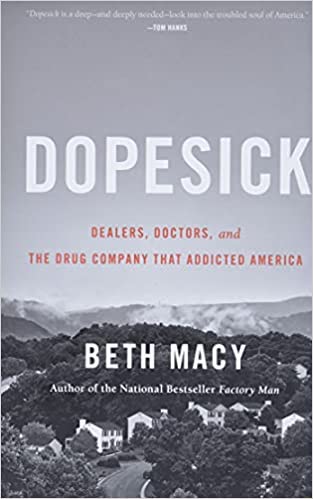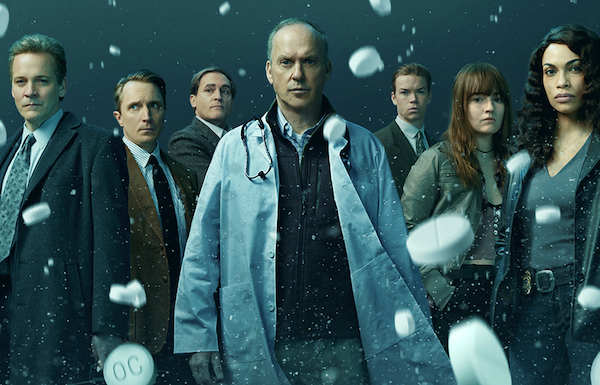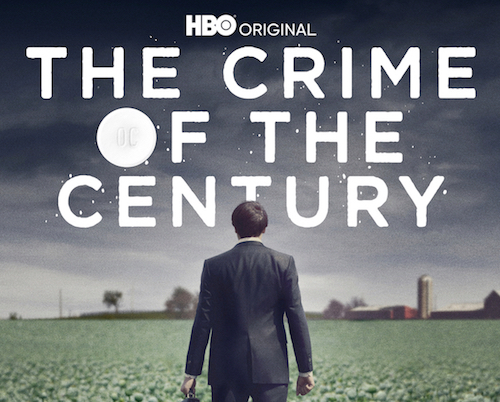The Hulu drama brings us uncomfortably close to the origins of the opioid epidemic, and the horrors it has wrought
By Jason Langendorf
From the opening scene of Dopesick, the new Hulu drama detailing the roots of America’s opioid crisis, the show creators leave little doubt about who they believe is to blame for what’s now the leading cause of preventable death in the U.S.
A close-up shot slowly pans away from actor Michael Stuhlbarg, who fixes his gaze on the camera and delivers a speech that borders on a plea—one that, on its face, would seem impossible for any sympathetic soul to ignore:
“The time has come to redefine the nature of pain. For too long, the American medical community has been ignoring chronic pain, and this has created an epidemic of suffering. When we live with pain, we are not living our true lives. We are not living our best selves. We are not even living at all. Because the pain overtakes our ability to think, feel, even to love.”
Dopesick cracks open the story to expose its beating heart: the profound human toll of its characters’ personal struggles amid safeguards and systems that fail them at every turn.”
But the monologue is sleight of hand, and the viewer’s sympathy quickly dissolves into cynicism. Stuhlbarg plays the role of Richard Sackler, the real-life scion of the founders of Purdue Pharma. The actor’s portrayal is, in a word, creepy—and it seems a deliberate choice. Richard, the awkward son of Raymond Sackler, one of three brothers who founded Purdue Pharma, is driven to leave his mark on the family business, and his speech turns out to be a pitch to his uncles. Richard proposes the creation of a new opioid-based painkiller, which would replace Perdue revenues lost to the expiring patent for MS Contin. When Uncle Mortimer objects on the grounds that doctors won’t prescribe an opioid for long-term pain, Uncle Arthur stops him.
“You don’t chase a market,” Arthur says. “You create it.”
Then he grins, waving his nephew in: “Please, Richard. Tell me more.”
The Dopesick Story

Can you see where this is going? Perhaps you haven’t read Beth Macy’s Dopesick, from which the Hulu series was adapted by show creator Danny Strong. And if you haven’t plunged into recent news accounts of Purdue Pharma, the Sacklers and the efforts of various government entities to hold the company and family accountable for their roles in precipitating an addiction and overdose crisis whose momentum continues to gather steam, you can be forgiven. Although we humbly submit our TreatmentMagazine.com “Explainer” on the subject, many of the reports are dense and difficult to parse.
But Hulu’s Dopesick, through the first three episodes made available thus far, is a faithful but engaging account of the origin of modern opioids in this country. It features excellent performances from an ensemble of heavy hitters (Michael Keaton, Rosario Dawson, Peter Sarsgaard) and esteemed working actors (Stuhlbarg, John Hoogenakker and Kaitlyn Dever). And while other entries have undertaken the heavy lifting of sorting out the facts, Dopesick cracks open the story to expose its beating heart: the profound human toll of its characters’ personal struggles amid safeguards and systems that fail them at every turn.
We see pharmacists’ livelihoods threatened, government agents thwarted by bureaucracy and corruption, and working folks fall prey to dependency and then face public blame from the company that had promised them a non-addictive wonder drug.”
We see Dever’s Betsy—a coalminer’s daughter who proudly throws herself into the family business—grit through a work injury and, later, through withdrawal from prescription painkillers. We see the skepticism of Keaton’s well-intentioned small-town doctor chipped away by a Purdue sales rep. We see that same rep pressured into driving sales using bogus propaganda. We see pharmacists’ livelihoods threatened, government agents thwarted by bureaucracy and corruption, and working folks fall prey to dependency and then face public blame from the company that had promised them a non-addictive wonder drug.
The Endgame?
The dust has yet to fully settle on litigation against Purdue Pharma and the Sacklers, and an objective viewer might fairly wonder if Dopesick’s characterization of the family’s greed, excess and indifference to the risks of OxyContin is a bit too on the nose. Still, Richard Sackler doesn’t quite fully embody the Emperor Palpatine of this Evil Empire. Although driven by insecurity and hellbent on elevating Oxy to a miracle remedy, Richard, more than once, expresses a genuinely altruistic purpose:
“Can you think of any greater venture to help humanity,” Richard asks his brother Jonathan, “than curing pain?”
It’s just hard to know whether he believes his own pitch.
Season 1, Episode 4 of Dopesick will be available to stream at midnight EST on Wednesday, Oct. 20, with new episodes posting every Wednesday on Hulu.














